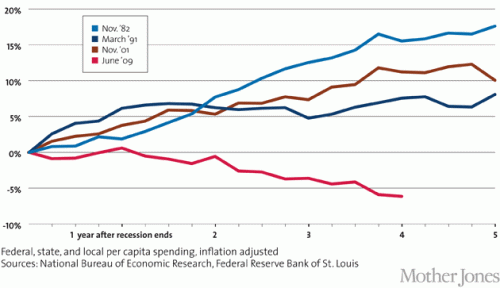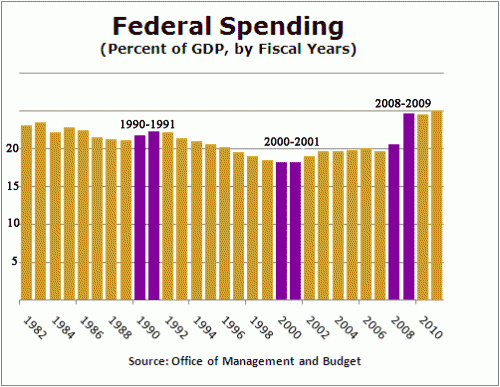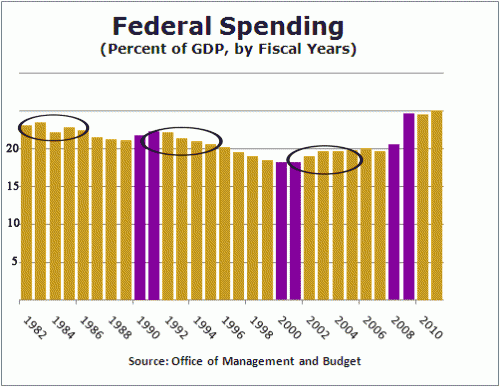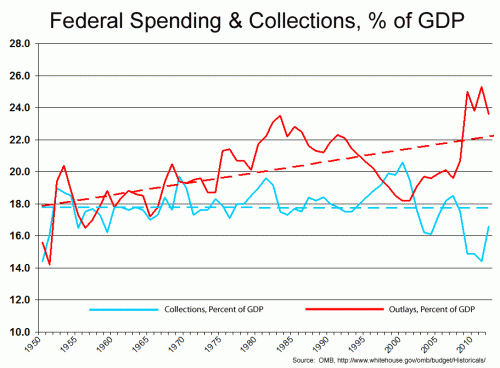OK, This Is The Most Absurd Defense I Have Seen of Obama, At Least This Week
Dave Weigel notes a conundrum today: according to a new poll, 54 percent of the public disapproves of Barack Obama's handling of the deficit. And yet, as the chart on the right shows, the deficit is shrinking dramatically. Last year it dropped by $200 billion, and this year, thanks to a recovering economy, lower spending from the sequester, and the increased taxes in the fiscal cliff deal, it's projected to fall another $450 billion.
Weigel notes that this has deprived conservative yakkers of one of their favorite applause lines: "You don't hear Republicans lulz-ing at Obama for failing to 'cut the deficit in half in my first four years,' because he basically did this, albeit in four and a half." That's true. It's also true that contrary to Republican orthodoxy, it turns out that raising taxes on the rich does bring in higher revenues and therefore reduces the deficit.
The logic here is that Obama has been diligent about cutting the deficit, so therefore Republicans are wrong to try to use the debt ceiling and continuing resolution as a vehicle for forcing more cuts.
It is just possible that a person from another planet landing today might buy this story, but how can anyone who has lived through the last 5 years read this without laughing their butts off? Every one of Obama's budgets have been dead on arrival, even within his own party, because they have raised spending to such stupid levels. There has not been even a hint of fiscal responsibility in them. And the Democratic Senate has passed one budget in something like five years**.
The only fiscal discipline at all has come from the Republican House, and they have only had success in keeping these deficit down by ... using continuing resolutions and debt ceilings as bargaining chips. This is the President that treated the almost insignificant sequester as if it were the end of the world, and now these sycophants from team Donkey are giving Obama the credit for the deficit reduction?
PS- This is not an advocacy for Republicans as much as for divided government. The Republicans when they had years of controlling the Presidency and both houses of Congress under Bush II did zero to get our fiscal house in order and in fact with the Iraq war and Medicare part D, among other things, showed a profligacy that belies their current pious words.
PPS- Kevin Drum needs to have the balls not to play both sides of the street. He has made it clear in other articles that he thinks it is an economic disaster that the government is spending so little right now. When he shows a deficit reduction chart, if he were consistent, he should be saying that Republicans suck for forcing this kind of deficit reduction against Obama's better judgement and we need the deficit to go back up. Have the courage of your convictions. Instead, he plays team loyalty rather than intellectual consistency, crediting Obama for deficit reduction while at the same time hammering Republicans for austerity. Dude, its one or the other.
PPPS- For the first time during this Presidency, both the President and both house of Congress offered a budget:
[The] House passed a budget calling for spending $3.5 trillion in 2014, the Senate passed one calling for $3.7 trillion, and Obama submitted one calling for $3.77 trillion
So the actor that submitted the highest budget gets the credit for deficit reduction?




